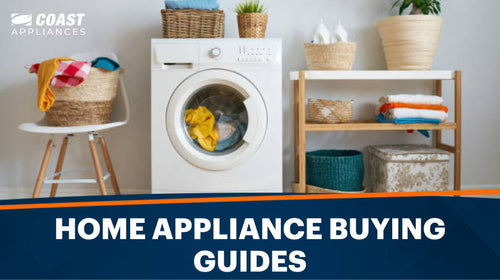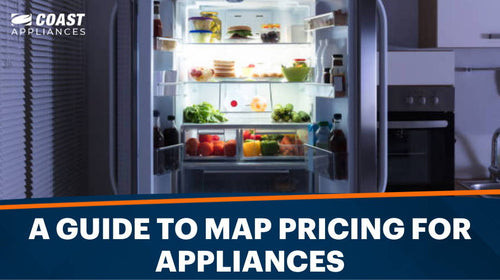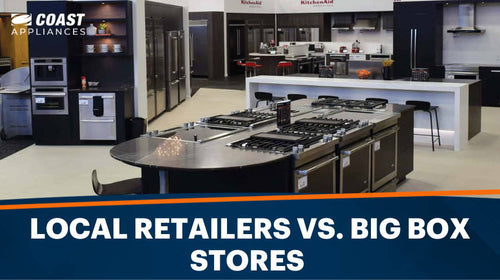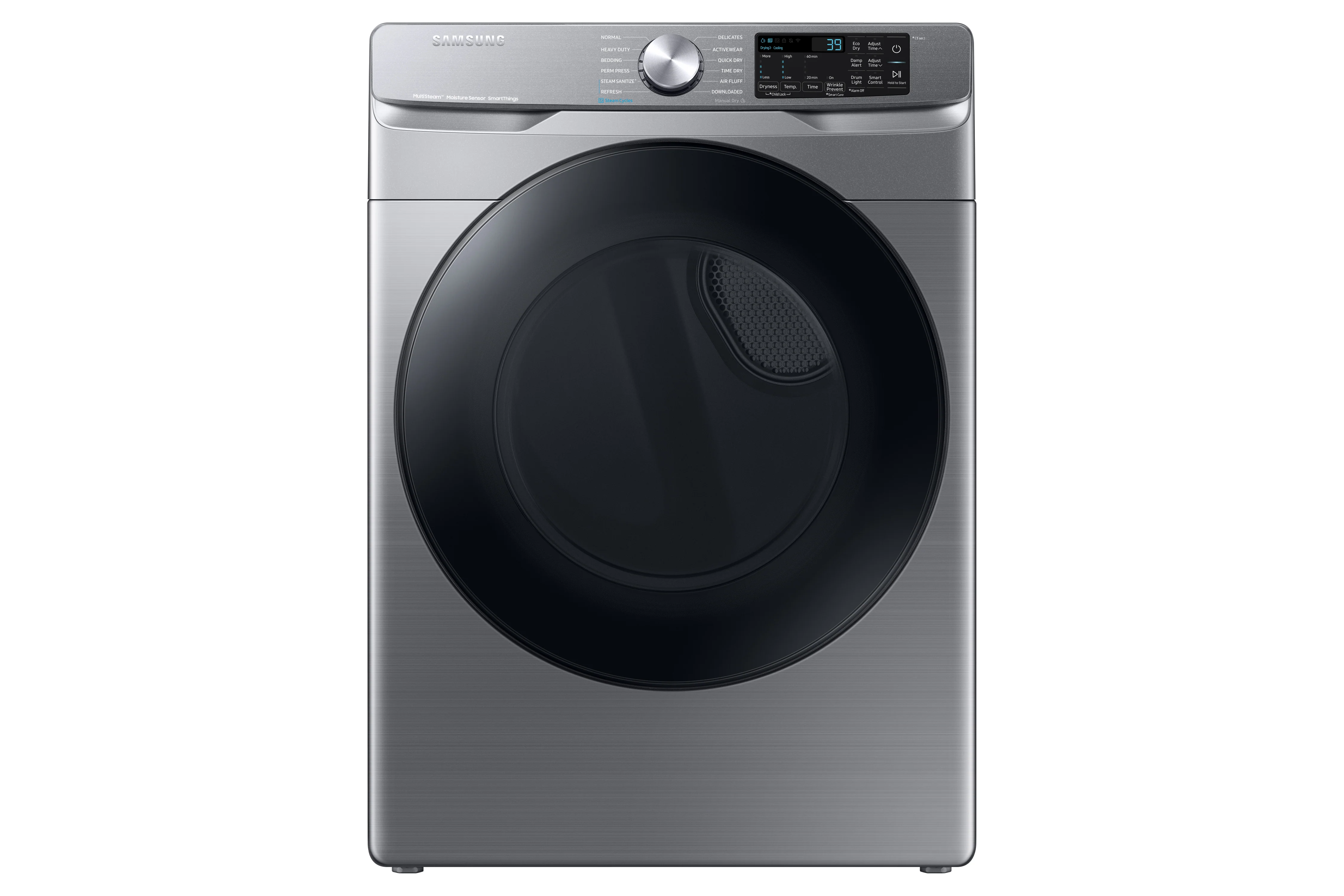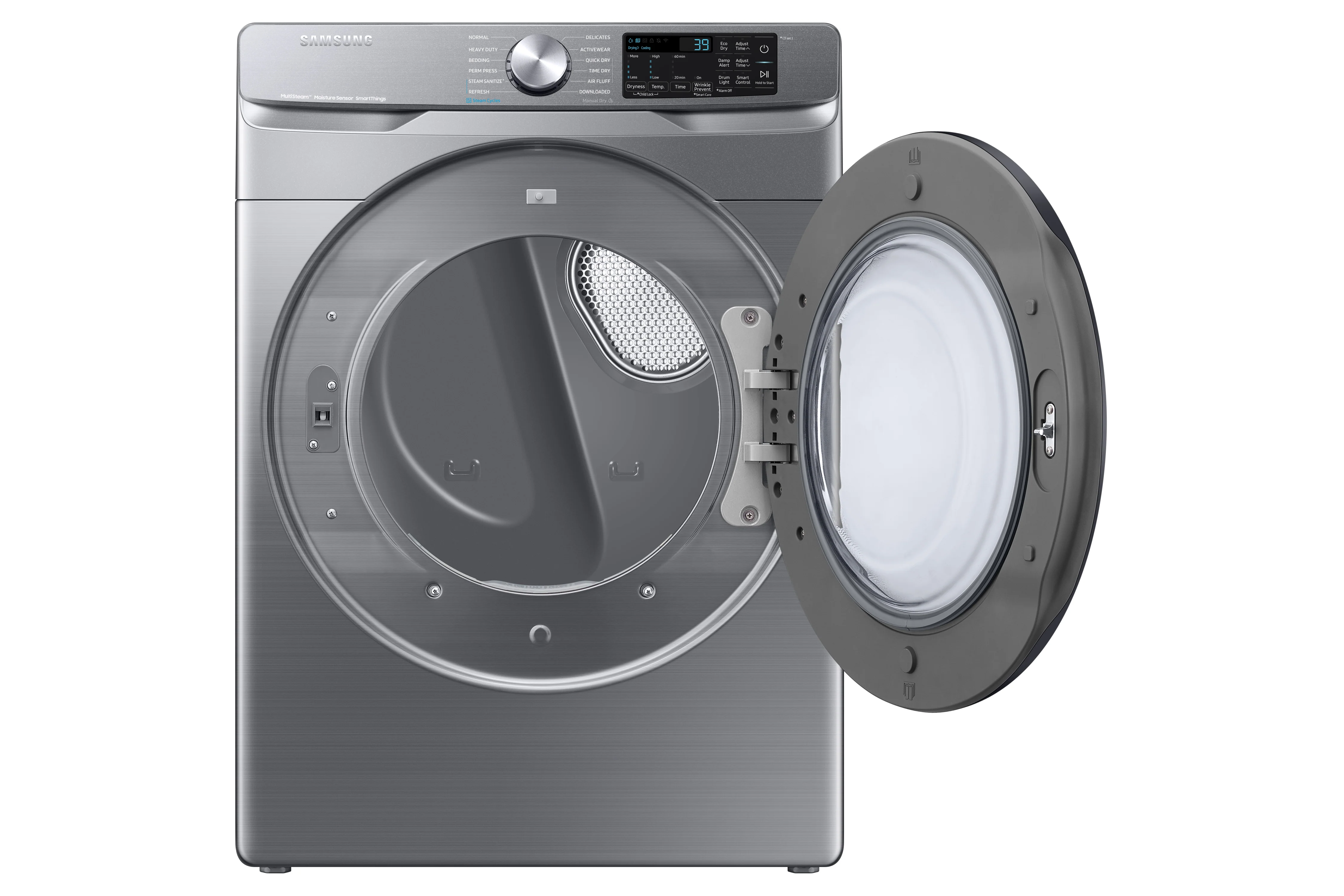Doing laundry is a repetitive, often dreaded, but necessary chore we all have to endure. The only thing worse than actually doing your laundry is deciding which new washer you should buy. There are dozens, if not hundreds of brands, features, styles and price ranges to consider.
And before you are ready to buy, you need to know a lot – things like: What’s the difference between front versus top load washers? How wide is a washing machine? Should you be willing to pay the extra cost to get a High Efficiency (HE) washer? Do you need a smart washing machine – are they really worth the cost? We’re answering all that and more, here.
Because we know, there’s a lot to think about before you’re ready to invest in your new washer. That’s why you need this washing machine comparison guide, with details on everything you need to know about purchasing a new washer. It’ll help you determine the best type of washer, and which optional features are worth it. We’ll break down what to look for in choosing the top best washing machines out there in 2024, so when you’re ready to buy, you have all the information you need.
In this article, we’ll cover:
Find Your Ideal Washer
Browse our full selection of washing machines today.
Types and Styles of Washers
What’s the difference between front loader and top loader washing machines? Would a stackable or compact washer and dryer better serve your needs? With so many different types of washers and dryers available today, it can be difficult to even just decide where to begin!
It’s OK. We understand how overwhelming it can be. And we’re here to help. A washing machine comparison guide like this is all you need to determine which type, brand and size of machine will best serve you.
Front Load Washers
Trying to decide between a front versus top load washer doesn’t have to be hard. After all, you’ll want to know what the top best washing machine on the market is regardless of which style you end up going with. You’ll also want to consider the advantages typical front load washers have over top load washers, including the fact that they:
- Use less water
- Are more energy efficient
- Spin faster so clothes will dry faster
- Are gentler on clothing
- Can be stackable, saving space
On the downside, because of the vertical door placement, front-load washers require an airtight seal to prevent leakage. When proper maintenance and cleaning aren’t performed, mold, mildew and bacterial growth can begin in and around the rubber seal. You’ll also have to bend over further to load and unload your front loading washing machine.
Top Load Washers
The advantages of top load washers include less bending or kneeling to load and unload, larger capacity, and a traditional appearance. They’re also less expensive than front loaders, on average. Top load washing machines aren’t as prone to mold growth because they don’t require airtight lids.
However, top-load clothes washers typically use agitators to clean clothing, which can stress some fabrics. Top loaders also might be more difficult for shorter people to load and unload compared to a front loader.
Compact Washers
Compact clothes washers are smart options if you’re trying to maximize limited living space. They fit great in apartments and condos and are also known as mini washing machines. About the size of a common dishwasher, compact washers are roughly 34 inches tall, 24 inches deep and about 24 inches wide. They’re able to fit in tight spots and still get the job done.
These small, energy-efficient units are perfect for lighter loads of laundry, making them useful for parents of newborns, college students and single people. Note that they may be too small for some laundry needs.
How to Measure a Washing Machine?
How wide is a washing machine? The width and average height of washer (and dryer) can vary slightly depending on the make and model. There’s also a size difference, as you probably guessed, between compact vs. full-size machines. This is why it’s important to measure the opening you intend to place your new washer in before shopping. Here are some smart tips for measuring:
Carefully measure and record the height, width and depth of your opening. All three measurements matter. Add an extra foot of height if you’re considering a top-loading washer. If vertical space is too limited, consider a front-loading compact washer instead.
Use the same measuring instrument when measuring the height, width and depth of a washer you’re considering. It’s better to have some extra space around the unit than it is to have your appliance packed in too tightly. This allows for easier cleaning and more efficient, cooler operation.
Standard dimensions of a washer and dryer are:
Width – 27” (you’ll need to plan for at least a 54” space if you’re doing a washer-dryer side by side set up)
Height – 38 - 43”
Depth – 28 - 34”
What Finishes and Colours Do Washing Machines Come In?
Washing machines come in many different colours and finishes, so you can match other appliances, countertops and paint colours, or you can make a statement with your new appliance. Consider the following options:
White: White is a clean, simplistic, fresh colour choice. It speaks of tradition, cleanliness and brightness.
Black: Strong, bold and beautiful, black and black stainless washing machines are alluring, modern and eye-catching.
Which Are the Best Washing Machine Brands?
We carry some of the world’s highest-rated manufacturers that produce some of the most high-end, best performing, energy-efficient washers on the market. Have a closer look at our three top best washing machine brands that consumers love:
LG Washing Machines
LG products have an excellent reputation for dependability, longevity and intuitive features. Eco-friendly and sleek designs keep winning LG international awards year after year.
Electrolux Washers
Electrolux focuses on front load washer technologies, and they’re very good at it. Multiple testing companies have consistently rated this Swedish multinational home appliance manufacturer at the highest levels for laundry care machines across various categories.
Samsung Washers
Samsung is world-famous for manufacturing reliable, innovative and feature-rich laundry machines for homes and businesses. Their front-load washing machines rate the highest in customer satisfaction according to J.D. Powers & Associates.
Maytag
Maytag washers are known throughout the industry and to consumers for their power, dependability and speed. Maytag has been manufacturing washers for over a hundred years, so they know a thing or two about the features and technology that turn a good washing machine into something people love.
What to Consider Before Purchasing a New Washing Machine?
Coast Appliances has washers and dryers with all the features you could ever want or need to accommodate every laundry headache you have. So, now that you know about the different types of washers, which one is right for you? There are multiple things to think about before you can decide. For example, you want to think about:
Space
Determine how much space you’re dealing with, first. Keep in mind that you’re going to need to fully open the doors, again and again. Will the washer fit through your doorway? Would stackable units serve you better? Before you buy, it’s essential that you correctly measure your space and consider standard washer-dryer width and size.
Capacity
Do you do a lot of laundry? Do you find you need to wash a lot of very large, bulky items? Is your family growing? Washing machine tub capacities range between 1 and 6 cubic feet. To determine the appropriate tub capacity you need, consider that a 4.5-cubic-foot washer is designed to handle 25 to 30 standard bath towels in a single load.
Laundry Habits
Do you run small, frequent loads of laundry? Do you leave clothes in your washing machine for long periods of time? Do you have lots of delicate clothing that could be damaged by an agitator? Thinking about your personal laundering habits can help you determine which modern features will best serve you.
High Efficiency Washers
What’s the best quiet washing machine? That depends on a number of things, including budget and which features you want. High-Efficiency (HE) washers are increasingly in demand these days. But that doesn’t mean everybody knows what they are or why they’re such a game changer in the world of laundry. If you’re wondering: Is my washing machine HE? What is an HE washing machine? How do HE washing machines work? There are a few things to note.
HE washing machines vs regular:
- Use less water
- Use less energy
- Have a very quiet operation
- Typically offer higher load capacities
- Use a rotating tub instead of an agitator
- Are gentler on clothes
An HE washer might be best if you have a lot of delicate clothing. While most HE washers are front loaders, there are some HE top-loaders available. Any washing machine that’s HE-rated will prominently display the HE trademark and logo.
Other Washing Machine Features
Modern washing machines are available with loads of features that you might not even be aware of before you’re in the market to buy a new machine. Especially if it’s been more than 10 years since you shopped for a washer, a lot has changed.
Here are some of our favourite new features you might find interesting and useful:
Energy Star Qualified: Energy Star Qualified washing machines and other appliances continue to become more mainstream. Washers with this distinction are more efficient, use less water and can save you a bundle throughout the machine’s life.
Wi-Fi Connectivity: Wi-Fi-equipped clothes washers can be controlled remotely with an app. How great would it be to have the ability to start your laundry from the other room, or even from across town!
Stackable: Stackable washer and dryer combos can maximize the usage of limited space. They can be tough to unload for shorter people though.
Steam: Optional steaming allows you to pretreat stains or just give your clothing a quick disinfectant refresh.
Agitator: An agitator rubs clothing to remove stains. An impeller is a lower profile, finned protrusion that’s much gentler on clothing than a traditional agitator.
Other available features of today’s most reliable washer and dryers include quick wash cycles, automatic balancing, delayed wash cycles, built-in pre-soaking sinks and automatic detergent dispensers.
As you can see, there’s a lot to consider when you’re purchasing your next washer. So take your time when looking. Enjoy browsing our full selection of washing machines – we’re confident you’ll find the perfect washer for your household needs.
Find Your Ideal Washer
Browse our full selection of washing machines today.
Washing Machine FAQs
How do I know if my washing machine is too full?
What is considered a load of laundry? That depends on your washer’s capacity rating. You can always use the “palm trick” to determine how much to load your machine. Simply ensure that you have enough room leftover in the tub after loading your clothes to place your hand palm-down inside the tub on top of the clothing. In other words, leave 2 or 3 inches from the top of the tub.
How to avoid overloading a washing machine?
Place each item to be washed in the tub loosely. Spread, or almost “sprinkle,” each item out and don’t pack the clothes in. Allow room for the clothes to move around and wash – they shouldn’t be packed together, which prevents them from really being clean.
Should I be cleaning my washing machine?
Consult your manufacturer’s guide to learn the recommended way (as well as how often) to clean your washer. Many people use 3 to 4 cups of white vinegar in a full tub of water without detergent or clothing. Allow the machine to cycle as normal.
What are the best washing machine brands?
It is likely you will use your washer regularly for many years, and choosing a good brand helps! The modern washers have come a long way from old time ones, with the many efficient and reliable brands available at Coast you’ll be sure to have a top quality appliance.
What is the average washing machine cycle time?
A typical wash cycle takes between 50 minutes and an hour. Of course, load size, cycle choice and other options will factor in. Most machines also have a quick-wash preset for those small, quick loads you need done fast.
How long should a washer last?
Depending on usage and care, an average washer can last about 10 years.
The information on this article is not a promise of service. While we present the most accurate information we can, customers must check each brand and model for the manufacturers' information. Each model has their individual care and maintenance guidelines, normal expected use and lifespan with proper maintenance and care. Customers are responsible for checking information for their appliance, the user manual, manufacturer guidelines as well as using professional services.

